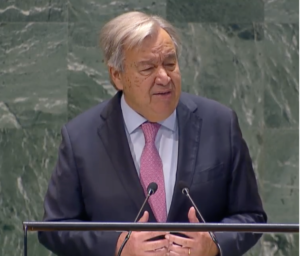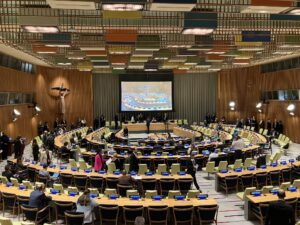Global Leaders Must Act Now on Nuclear Disarmament
Amid Rising Geopolitical Tensions and Technological Advancement
On September 26, 2024, United Nations Member States convened for a high-level plenary meeting to commemorate the International Day for the Total Elimination of Nuclear Weapons (Resolution 72/251), emphasizing multilateral cooperation for a nuclear-free world.
Key messages arising from the meeting included:
- Existential Threat of Nuclear Weapons: Nuclear weapons pose a severe risk amid rising geopolitical tensions, condemning Israel and Russia for recent nuclear threats.
- Erosion of Disarmament Frameworks: The NPT, particularly Article 6 on disarmament, is being undermined, with recent Review Conferences failing to reach consensus. Member States urged universal adoption of the TPNW and CTBT.
- Call for Political Will, Multilateral Cooperation, and Leadership: Member States stressed the lack of political will, particularly of nuclear states, to lead disarmament, reduce arsenals, and halt modernization efforts, including risks associated with AI, cyber warfare, and biological weapons.
- Regional Concerns: Member States raised issues, for example, nuclear-weapon-free zones in the Middle East, Latin America, and Southeast Asia, the impact of Pacific nuclear tests, and called for redirecting the $91 billion spent on nuclear weapons towards global needs like development, health, and environmental recovery. Some emphasized the importance of peaceful use of nuclear energy as a climate-friendly energy source.
Opening Statements
President of the General Assembly, Mr. Philémon Yang, warned of escalating “nuclear blackmail,” citing reckless threats of nuclear use and advancements in weapons technologies like AI and cyber weapons. He noted the heightened nuclear risk, unseen since the Cold War. He urged Member States to accede to the Treaty on the Prohibition of Nuclear Weapons (TPNW), Non-Proliferation Treaty (NPT), and the Comprehensive Nuclear-Test-Ban Treaty (CTBT). He emphasized that Member States must work together for the successful 2026 Non-Proliferation Treaty (NPT) Review with nuclear-weapon states taking the lead and in reducing arsenals. He urgently called for the USA and Russia to resume negotiations under the New Strategic Arms Reduction Treaty (New START).

“Luck is not a strategy; Stop gambling with humanity’s future” -United Nations Secretary General, António Guterres
UN Secretary-General António Guterres reaffirmed that nuclear weapons have no place in today’s world, warning that despite 10 years of disarmament efforts since 2014, progress is moving in the wrong direction. He cautioned against relying on luck to prevent nuclear catastrophe, referencing the 1945 bombings of Hiroshima and Nagasaki. The Secretary-General called for increased political will, transparency, and non-use pledges from all Member States, urging renewed disarmament efforts, especially from the USA and Russia.
Highlights from Delegations’ Statements
The Marshall Islands along with Fiji and the Solomon Islands the suffered devastation from 67 US nuclear testing, the size of 1.6 Hiroshima bombs every day for 12 years, between 1946 and 1968, without consent and emphasized the need for reparations, environmental clean-up, and the return of displaced people. The Solomon Islands emphasized the devastating effects of nuclear tests and the dumping of nuclear waste in the Pacific, calling for reparations and the complete eradication of nuclear weapons.
Uganda spoke on behalf of the Non-Aligned Movement’s 121 Member States, reaffirmed the commitment to nuclear non-proliferation emphasized total elimination as the only way to prevent nuclear threats. It called for the implementation of commitments from past NPT Review Conferences, condemned Israeli threats, and called for the establishment of a nuclear weapon and WMD free zone in the Middle East.
Along similar lines, Egypt, Tunisia, Morrocco, and Burkina Faso expressed concerns over nuclear disarmament stagnation, calling for a Middle East nuclear-free zone. Morrocco also noted that African states have organized meetings jointly with the US to raise awareness of security threats and strengthen nonproliferation and disrupt trade in WMD across Africa. Burkina Faso urged the entry into force of the CTBT, which still requires ratification by nine key states (China, India, Pakistan, North Korea, Israel, Iran, Egypt, Russia and the USA).
Libya along with South Africa urged Member States to follow the example of Libya, South Africa, Kazakhstan, and Belarus in relinquishing nuclear weapons programs. Libya condemned Israel’s nuclear threats in Gaza. South Africa called for compliance with Article 6 of the NPT, [which requires that States Parties “pursue negotiations in good faith on effective measures relating to cessation of the nuclear arms race at an early date and to nuclear disarmament, and on a treaty on general and complete disarmament under strict and effective international control.”]
Cuba highlighted the alarming existence of over 12,000 nuclear warheads, with more than 4,000 deployed and 2,100 stored in States with ballistic missile programs. It criticized the vast financial resources spent on nuclear arsenals, particularly by the USA, and argued that these funds should be redirected toward global development and poverty alleviation.
Venezuela along with Brazil and Argentina criticized states that continue to modernize and stockpile nuclear weapons. Brazil and Argentina, serving as a model for nuclear weapon free zones through their commitment to both the Tlatelolco Treaty and the NPT, emphasized the urgency of achieving universal ratification of these agreements.
Kyrgyzstan, yet to ratify the TPNW, remained a strong advocate for nuclear disarmament and proposed March 5 as an International Day for Disarmament and Non-Proliferation Awareness. Appealing for support of Kyrgyzstan’s candidacy for non-permanent membership on the UN Security Council for 2027-2028, it emphasized disarmament as a priority.
The United States of America, while yet to sign and ratify the TPNW, regretted that the progress to reduce nuclear arsenals is now at risk due to the abandonment of agreements and irresponsible nuclear rhetoric. Consistent with the NPT, the USA extends nuclear deterrence to allies, so that they do not feel the need for nuclear weapons in their own defense. The USA emphasized the importance of multilateral disarmament agreements. It supported the upholding the NPT, advancing the Nuclear Test Ban Treaty, and banning fissile material for nuclear weapons. The USA regretted the cynical veto to a Security Council resolution (6 months ago) banning the placing of nuclear weapons and other WMDs into orbit, in line with the Outer Space Treaty. The USA remained ready to engage constructively with Russia on bilateral arms control and with China on reducing nuclear risks, but they need to demonstrate willingness to engage.
India called for political will and the universal, nondiscriminatory and verifiable nuclear disarmament within a specified timeframe as proposed in its step-by-step approach for the total elimination of nuclear weapons working paper submitted to the Conference of Disarmament in 2007. It called for a comprehensive nuclear weapon convention to serve as a global platform for multilateral disarmament negotiation. As a responsible nuclear state, India is committed to a no first use policy and non use against non-nuclear states. India holds an annual disarmament fellowship program to educate neighboring countries on disarmament issues.
Civil Society Contributions
The International Committee of the Red Cross (also on behalf of the International Federation of Red Cross and Red Crescent Societies) expressed concerns over the lack of progress in nuclear disarmament and outlined four key steps for achieving total elimination of nuclear weapons:
- All Member States must uphold the comprehensive ban on nuclear weapons as established by the TPNW and reaffirmed in the Pact for the Future.
- Cooperation and synergy between the TPNW, NPT, CTBT, and regional treaties establishing nuclear-weapon-free zones must be strengthened, with a call for universal ratification of these agreements.
- Urgent action is needed to prevent the deliberate or accidental use of nuclear weapons.
- The harm caused by nuclear testing must be addressed in all nuclear-weapon-free zone treaties.
The Pacific Islands Forum highlighted that between 1946 and 1996, over 300 nuclear tests were conducted in the Pacific Islands without consent, leaving lasting impacts on health, displacement, and environmental damage. The Forum strongly urged nuclear-armed states to uphold Article 6 of the NPT, along with all nuclear safeguards and safety protocols. In particular, they called on the USA to ratify all protocols of the South Pacific Nuclear Free Zone Treaty (Treaty of Rarotonga, 1985), which prohibits the use, testing, and possession of nuclear weapons in the region. They also emphasized the need for continued support in remediation efforts.
International Physicians for the Prevention of Nuclear War (IPPNW) called all Member States to fulfill disarmament obligations and ratify all the UN disarmament treaties without delay!
The meeting concluded with a sense of urgency to strengthen multilateral cooperation and a successful outcome of the NPT Review Conference in 2026.




